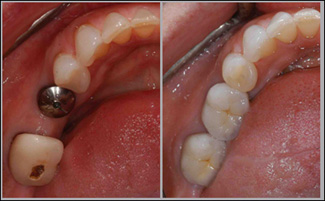What are Dental Implants?
A dental implant is an artificial substitute/replacement for the root portion of your natural tooth and is anchored into a pre-drilled socket in your jaw-bone to support a crown, bridge or secure a denture firmly in place. Implants are made from titanium, a material that is well tolerated by bone and integrates easily with bone tissue. During the dental implantation placement, the goal is to achieve a close contact between the outer surface of the implant and the surrounding bone tissue so they can “fuse” together creating a stable support for the new teeth. The time frame to complete a dental implant is usually 3-6 months.
How is a dental implant placed?
Before any implants are placed, it is important for your dentist to assess the health of your teeth and gums. If there are any signs of gum disease or decay, these must first be treated. Thereafter, your treatment will be planned following several x-rays and, in some cases, a CT scan to assess that bone quality and check for nearby anatomical structures to avoid before any drilling. The dental implantation procedure is usually carried out under local anaesthesia; IV sedation is sometimes used if it is a long procedure or the patient is very anxious.
The gum where the implant is to be placed is cut and lifted and a small hole is drilled in the jawbone at the precise location of the intended implant. The titanium implant is tightly fitted into this socket and the gum is stitched back over the implant. If there is insufficient bone material to accommodate the implant, a bone graft may be required, or the dentist may use smaller-sized mini implants if suitable.
Once the implant has been placed, it is left to heal and integrate with the jawbone for between three to six months. The bone tissue will grow and anchor itself into the microscopic rough surface of the implant.
During this “healing period”, patients are given temporary teeth (bridges) or continue to wear dentures. It is important that temporary teeth do not exert any force on the healing implant. After the healing period, the gum is again lifted and a post is attached to the implant with a temporary crown. Four to six weeks later, when the surrounding gum tissue has matured, the final permanent restoration can be fitted to the implant and the patient is left with a robust and reliable implanted tooth.

–What are the advantages of dental implants over dentures and bridges?
Reduced Bone Loss
Bone which is found in your jaw is what supports your teeth in their individual sockets, along with other surrounding ligaments and tissues. Bad oral hygiene and buildup of plaque and calculus, if not removed by a dentist or dental hygienist, can then result in destroying the surrounding tissues, which then make your tooth/teeth loose, leading you towards dental extractions.
Once you have gone through the process of having an extraction, you will then be left with a gap, which most people want filled, as missing teeth don’t look very appealing. Options for filling gaps are dependent on each patient, as every patient is different. Some people have dentures made, which are removable, others don’t like the idea of removing teeth, so therefore look for permanent solutions, like dental bridges. There are pros and cons to every treatment option. With a bridge, the teeth either side to the missing tooth needs to be adjusted to accommodate the bridge, which is slightly destructing to a ‘healthy’ tooth, which isn’t always advised by your dentist, especially if your existing teeth aren’t very stable as it is, so in some cases this isn’t a choice. Also, if you have a bridge fitted, and in the future one of teeth which the bridge is been cemented onto has a problem, the whole bridge needs to be removed. Which can then be a waste of time and money for the patient.
With an implant, no other teeth need to be treated. If from your previous tooth extraction, you’ve been left with minimum bone, a bone graft can be taken place, with artificial bone, so the implant can sit safely and securely in the jaw.
If you decided to go ahead with dental implants, you will notice the function of the implant and your jaw is almost as good as your natural teeth, as if you never even lost a tooth. Because the implant is made of such strong titanium and dental implants risks are very low, you can literally eat whatever you like, without feeling at threat that something is going to come away or break. You will notice your confidence will rise and you no longer have to hide gaps in your smile. Your speech won’t be affected, so no need to worry about that. Comparing as mentioned before, dentures to implants, your dental implant if fixed, and can last from nearly up to a lifetime, if looked after properly as instructed. But dentures can be a pain to patients, as they can move when eating, and often cause sore spots where the acrylic rubs on the gum, causing ulcers. When first having dentures fitted, patients 9 times out of 10 will need to return to their dentist for adjustments until they fit properly, as it’s a big prosthesis and something new in your mouth, it will take time to get used to. To avoid dentures rubbing and moving on the gums, you can get dentures made which lock onto your implant, this option makes the denture more secure, as it has something to anchor onto. This greatly improves the denture, especially with eating.
Improved Dental Hygiene
With dentures and bridges, special cleaning is required to keep up with good oral health. With implants, the cleaning isn’t so intense, its similar to brushing your natural teeth, like brushing twice a day, flossing the area daily, and seeing a dental hygiene once or twice a year.
If the implanted tooth is fitted properly, it should blend in nicely with the other teeth, being hardly noticeable, unlike other appliances, where they can look obvious its unnatural.
Am I a suitable candidate for dental implants?
Dental implants can be placed in patients of any age above 18-21(with fully developed jawbones), provided that they have a sufficient quantity and quality of bone tissue available. Most healthy individuals that maintain a good oral hygiene program are suitable candidates for dental implants. Circumstances where implants may not be suitable, or situations that have an increased risk of implant failure, include:
Heavy smoking – this slows down and hinders the healing process.
Excessive alcohol intake – disrupts healing of the gums.
Periodontal gum disease – all active gum disease must be treated prior to any implant procedure to ensure the long-term success of any treatment. Periodontal disease is a major cause of bone loss, which would hinder the success of any implant procedure.
Immuno-compromised individuals (steroids, auto-immune disease, patients undergoing radiation treatment).
Teeth grinders (bruxism) – a night-time splint can be given to treat this.
How will I know if I have enough bone for implants?
Using a combination of dental X-rays and a CT scan, your bone density and volume can be assessed, and information about nearby anatomical structures to avoid (such as nerves) can also be gathered.
What if I don’t have enough bone for dental implants?
The alternatives for replacing missing teeth include dentures and bridges. However, there are various bone-grafting and tissue-regeneration procedures that can be carried out to enable treatment with dental implants:
Sinus augmentation – if you need to replace missing teeth at the back of the upper jaw, a sinus augmentation, whereby new bone in the sinus is created, can increase the height of the bone available for the placement of implants in this area.
Onlay grafting – this is where a piece of bone is taken from somewhere else and secured over an area that is deficient in bone; over time, the newly placed bone will fuse with the underlying bone creating a better environment for an implant to be placed.
How long do dental implants last?
Dental implants have been used for over 30 years to replace missing teeth and they can last a lifetime depending on how well you look after them. Like any other restoration, your implant-supported teeth can still be damaged by trauma and affected by gum disease and poor oral hygiene.
Perfect Smile Spa based in Hornchurch Essex is a Leading Cosmetic and Implant Dental practice and is dedicated to PAINLESS dentistry. We work very closely with our prosthodontist who is on the specialist register.
Call us for a free consultation on 01708 398 775 or email care@perfectsmilespa.co.uk
Are Dental Implants Safe? was last modified: June 29th, 2018 by Dr Jas Sagoo




 132a High Street
132a High Street 01708442114
01708442114  care@perfectsmilespa.co.uk
care@perfectsmilespa.co.uk


